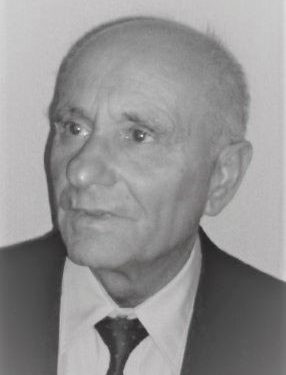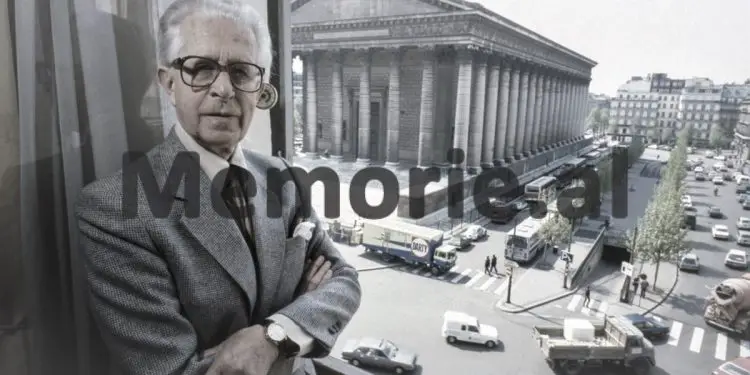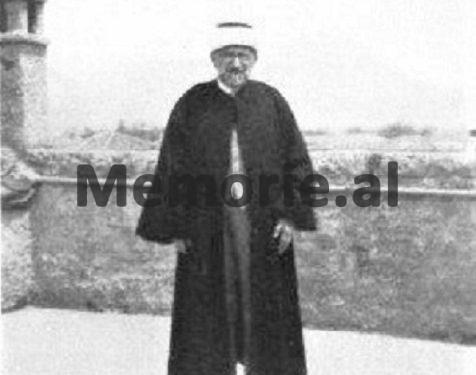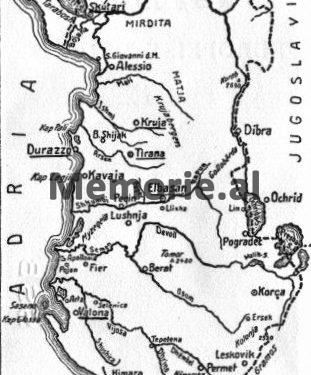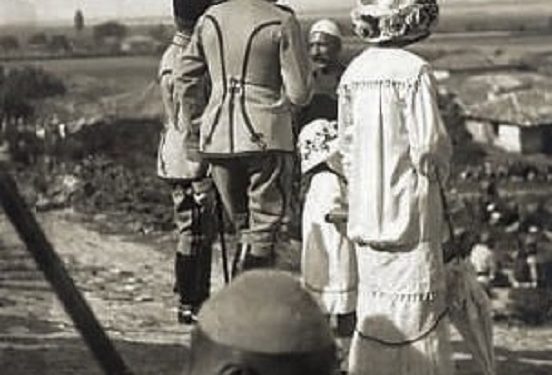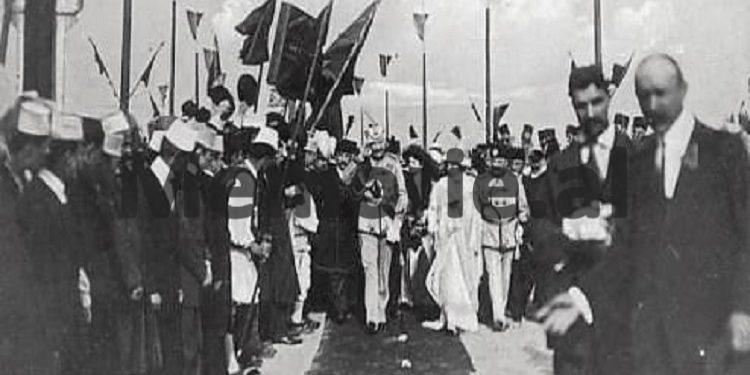By Sven Aurén
Translated by Adil N. Bicaku
The fifth part
ORIENTI EUROPE
Land of Albania! Let me bend my eyes
On thee, thou rugged nurse of savage men.
Lord Byron.
In the book “Orient of Europe”, the author of the work is the Swede Sven Aurén. They are impressions of traveling from Albania from the ‘30s. His direct experiences without any retouching.
In a word, the translation of the book will bring to the Albanian reader, the original value of knowing that story that we have not known and we continue to know it, and now distorted by the interests of the moment.
Now a little about what these lines address to you: My name is Adil Bicaku. I have worked and lived for over 50 years in Sweden, without detaching for a moment, the thought and feeling from our Albania.
I am now retired and living with my wife and children, here in Stockholm. Having been for a long time, from the evolution of the Albanian language, which naturally happened during these decades, I am aware of the difficulties, not small, that I will face, to give the Albanian reader, the experiences of the original.
Therefore, I would be very grateful if we could find a practical way of cooperation together, to translate this book with multifaceted values.
Morally, I would feel very relieved, paying off part of the debt that all of us Albanians owe to our Albania, especially in these times that continue to be so turbulent.
With much respect
Adil Biçaku
Continued from the previous issue
The days passed.
Order began to be established in the Royal Court. The princely family spent most of the day in the small garden, where some comfortable sofas were placed, down there by the sea, from where you could see over the Adriatic and dream again of the Neuwied. Occasionally, a mountain leader would come down to the city accompanied and search for an audience. He was received with great formality and informed by the incumbent, that the Prince likes to be called “His Majesty” or “His Majesty”. He took a decoration with him when he left Durrës.
The King, however, did not make any profound impressions: the clumsy demeanor, the shyness, the almost exaggerated smile, did not give a convincing impression. Bajraktari returned to his mountains, where in a general gathering, he gave his opinion about the God of Albania. Wilhelmi took several small government measures, one of which was not appropriate, to arouse sympathy: he cut off cooperation with the International Commission, based in Durrës, and whose task was to work for the organization of the Albanian state. The offended commission moved back to Vlora.
The prince was presented with some ideas, that he should make several visits to his country, appear before the people and seek to gain sympathy, through personal contacts. Wilhelm absolutely did not accept trips to this place of pirates! “But does not his majesty want to at least appear before the inhabitants of Durrës”? After much hesitation, Wilhelm was persuaded by these prayers, but in his own special way. He went out alone with his wife, knowing full well that no Albanian assassin would ever shoot at him when he had a woman by his side. But the Albanians realized this ploy and the whispers about the King’s fear and the new rumors became more widespread.
A few weeks later, when pessimism grew to open dissatisfaction, when his Excellency, the Minister of Interior and War felt himself strong, that he might begin to seriously intrigue, then begins the second and final act of operetta. It is a short but intense act. The first scene represented a mountainous province in the south of Albania; the second was played in Durrës.
***
It started with what is believed to be a Greek-inspired revolt in southern Albania. The army of the Albanian government is trying in every way to cope with the rebels, but the causes of the uprising seem to have inexhaustible resources when it comes to weapons and money. The head of the Dutch Military Commission in Durrës, Lieutenant Colonel Thomson, with the task of organizing the future gendarmerie of the principality, wants to stop the war, through direct talks with the official leader of the insurgents, Zografos, and therefore travels to the front.
He is called to return urgently by Esad Pasha. His Excellency does not see him in such a hurry for peace agreements. The point is actually this that is his excellence, which lies behind the revolt. The Minister of War and Interior is the Commander-in-Chief, both over the rebel troops and over the government army.
You can call this strategy!
In Wilhelm’s bedroom, the ghost of Emperor Maximilian appears at night, more and more often, and the Prince fades and becomes more nervous with each passing day. According to the best Prussian military method, it is provided with a war map. Esad Pasha presents daily reports, anxiously awaited in his study.
– Your Majesty, says Esad and as worried wrinkles his healthy face, I am unfortunately forced to announce some successes of the insurgents in Gjirokastra. If Your Majesty allows me, so I would propose again, again, an offensive in the Saranda area. In this way we would attack the rebels from behind…!
– Well, dear Assad, says Wilhelm in a trembling voice, where he is sitting and leaning on the map of the war with colored needles on his head. I completely trust you. You know which measures are most effective.
His Excellency bows with much respect and walks away. As soon as they can hold those little feet to him, that body so thick and fat as a chariot mule, he is Pasha also as a figure, then run back to his service room, where he immediately entered function as commander of the rebel army. The courier horses leave Durrës with a revan. Telegraph works:
GOVERNMENT BODIES PLAN OFFENSIVE. SARANDË. STOP. TAKE A MEASURE. STOP.
The other. The other.
But unaware of the successes, his excellence actually takes the strange strategy a bit further. The secret, which is the Minister of War and Interior, who is the real leader of the revolt, can no longer be kept secret. His Excellency must escape. He was taken to Bordeaux in an Italian destroyer and goes to Italy, where the roads are already open for him, as well as for anyone who contributes to incite more unrest in the Albanian principality and help, to pave the way for an Italian mandate.
Wilhelm let out a sigh of relief, but the disappearance of the Minister of War and Interior from the arena does not help the situation. The fire is spread in large proportions, boils a little everywhere in the country. This powerful Pasha has followers in Tirana, only thirty miles away from Durrës and is already whispering about revolt in this city as well. From these I said and say, the Prince completely loses the concepts: he sends a body to Tirana, with the desperate order, to shoot at every armed individual, even though he has already managed to conclude that Albanians, by tradition, always come out armed. It turns out quite naturally, fire against loyal citizens and with this, Albania is definitely on fire.
A few days later, bullets were heard inside the “Palace”, on the outskirts of Durrës. Wilhelm’s frustration turns to hysteria. Yellow as a corpse from horror, Skanderbeg’s successor sits down with the lady, the adjutants and the ornaments, in a boat and sails, to one of the Italian destroyers, who all the time since he came, have been on standby near the pier. This is the greatest idiocy in general that he invented. The news flew over all of Albania and from north to south; there was an echo of a gas explosion all over the country. The insurgents laughed, the loyalists of the government laughed, all the old warlike people shook with laughter. They were ready to cease hostile quarrels. This is ridiculous anyway: Skanderbeg’s successor is afraid of bullets…!
With much difficulty and with the mobilization of all possible persuasive skills, the members of the government managed to persuade the head of state to come back to earth. Wilhelm hesitated too long. It is quite safe on the military steamer and the large ball on the cabin door, makes a good impression on a terrified mind. With an announcement as if the Prince just wanted to accompany the family, they try to cover up this embarrassing incident, but it is already too late. The king has made himself ridiculously hopeless.
Even during the siege, he does not do anything to repair the damage to his image. He was even military; he could stand with troops, give them courage, and be a good example for them. Dr. Roloff tells the Leipziger Neueste Nachrichten that the brave Colonel Thomson, who, among other things, gave his life for Wilhelm’s sake, said in a way about the Prince’s fear, which we cannot write in the newspaper. Wilhelm, marching back and forth in his rooms, what would fit in the suitcases, not yet well packed. This was his activity.
A few weeks later, he could no longer cope. He took a boat again and sailed for the Italian military steamer ‘Misurata’, but this time never to return. On September 3, the steamer on the horizon disappeared and a principality collapsed completely after five months of existence. Two weeks of splendor and celebration, four and a half months of chaos and turmoil, intrigue and human wickedness. The “Wilhelmian Era”, which Austrian diplomats believed to have come, when the princely couple set foot on Albanian soil, never became an epoch, but a tragic-comic episode.
Perhaps it would have been an era, if the King had some spirit from Skanderbeg, if he had been portrayed as a man whom the Albanians expected him to be. But now even if Wilhelm, indeed, was a personality, it would still have been difficult, too, to maintain calm and order in a principality, whose political preconditions, unfavorable and doomed dogs, had already failed. .
On September 3, the curtain of the stage was closed for the operetta of the Albanian Prince. Wilhelm formulated the last retort of the operetta himself, and he did so in a way that almost gave rise to a monumental rise, which formed pre-war diplomacy, in the strangest way, from Austria’s fame in the use of politics in the Balkans. Before sinking on the Italian steamer, he managed to address a farewell greeting to the Albanian people, a proclamation with the following content:
THE PRINCE OF ALBANIA SEES IT MOST SUITABLE TO GO TO THE WEST FOR A TIME.
WILHELMI
These dignified words, a splendid uniform and the décolleté of the princess, in a Muhammadan country, so now, over twenty years later, seem like the five main months of his significant reign.
“… To travel for a while, to the west” is the farewell statement. The words have a deeper content than can be believed. For Wilhelm av Wied, the operetta is not over yet and today. He has never abdicated. The de Gotha calendar, still in its 1935 edition, contains two princely houses: King Zog and Prince Wiedit. He left the country on September 3, 1914, writes about the latter even this small addition, which says more than volume: reservant ses droits.
He has not yet surrendered to restore his princely throne, this eminent old gentleman, who now walks on the boulevard of Nice, with a lily flower on the collar of his coat. He is always a contender. He is the Prince of Albania and King Zog and usurper, who have taken power by force, in this strange country, on the Adriatic coast, where rifles are an equal necessity, like clothes, pants or shoes.
But what is more insecure than the world of politics? New winds may blow, a day may come when the Albanian people send a new delegation to the legitimate sovereign and respectfully ask a question, if he wants to come again and ascend the throne. That’s exactly it: if he wants to! But it is quite exhausting to rule Skanderbeg’s war suckers. This old Prince thinks where he walks and thinks about his lost Albania, which never became an Arcadia, although the words sound the same.
And yet, they are absolutely so different.
The sound of bullets in Sarajevo was felt all over the world. The desolate Prince Wied, is only the first in the long line of Kings and Princes, who must give up glory and splendor for a modest life. Stormy waves of war crash over Albania. The old highland people again forced to leave their country, for the scene of superpowers for bloody settlement. The Greeks invaded the south of Albania; the Serbs kidnap the middle part of the country: Pogradec, Tirana, Elbasan, Montenegrins march inside the dream city of Shkodra, high on the northern border.
Italy of course takes Vlora. And in this panorama of general robberies, the old fox, Esad Pasha, joins. With his tail under the saddle he was forced to flee, when the ground became too hot in the principality. Now he is back as a triumphant. King Assad I is always amused by his intellect and he has a successful start by being installed in Durrës as a self-appointed “dictator”. His list of merits is impressive about this situation. In turn and with different successes, he has sold himself and his country to Turkey, Montenegro, Prince av Wied, Italians and Serbs.
At the end of 1915, the image transforms character. The Serbian army during its terrible retreat crosses the whole country, up to Durrës, from where those surviving bodies board the steamer to Corfu. The Serbs are followed by the Austrians and follow the same path as their fleeing opponents. The Italians expanded from Vlora, over the southern part of the country. The French are approaching the southeast.
The Korça garrison already had acquaintances with the French Intelligence patrols. So the situation seems to have stagnated and continues to have in general, the same picture until the outbreak of 1918. Esad Pasha, who felt a little nervous as a dictator, fled to Thessaloniki. This good Assad does not have it easy. Every time he has the chance of the Royal throne ready, the superpowers come and destroy everything.
A world of suffering and bloodshed, sighing with relief when the ceasefire was finally sounded. An exhausted and miserable Albania, she also sighs relieved, hoping to wake up. The Allies have fought for great goals, the Albanians think, for freedom and self-determination, for a better life, for countries and peoples. People have high hopes for the Paris Conference.
Calmly and confidently, that justice will now finally be given to a people who were plundered and oppressed, since the dawn of history; a provisional government is formed in Durrës, headed by Turhan Pasha. Then the wait. A couple of months. Four five. But foreign troops continue to be, on Albanian soil and the Albanian people, still cannot participate in talks on the decisive future of the country. Gloomy rumors circulate. Whispers of a division of the country. Greece, Italy and the newly formed Yugoslavia, rush with their demands for the coasts of Albania.
The game of old intrigues from 1912, is back to its peak. The battlefield is still evaporating from the blood, but the warring powers seem to have learned nothing. It is not a question of setting boundaries according to the will of the people, but how it is just and free. This is the same old and disgusting story: the winners’ war for plunder. The desire for strength intensifies more than ever.
In 1920, when two years in vain, waiting for the decision of the superpowers, the Albanians think that they have waited a long time. A congress convenes in Lushnja and decides to hold elections to create a national assembly. The new parliament elects the government and the new government convenes for the first time in Tirana, on March 27 of the same year. The post of Interior Minister was given to a 25-year-old man: Ahmet Bej Zogu.
The news about the Albanian government flies abroad in the world, but it is only an announcement, in the foreign sectors of the newspapers. Who has time in these fateful days, or interest in the ancient throne of Prince Wiedit, on the Adriatic coast? Memorie.al
The next issue follows




